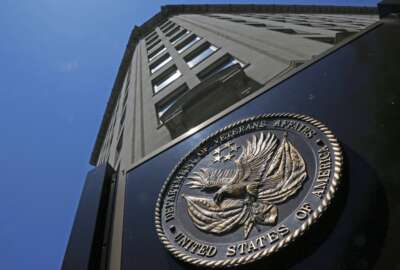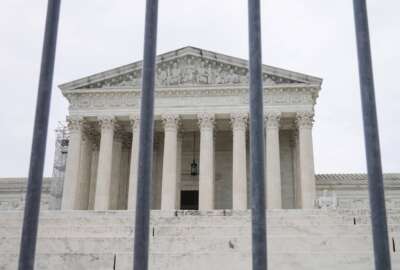Still a lot of work to do to gain the trust of VA whistleblowers
The VA’s Office of Accountability and Whistleblower Protection (OAWP) – set up in the aftermath of the department’s secret wait-list scandal – got off to a...
The VA’s Office of Accountability and Whistleblower Protection (OAWP) – set up in the aftermath of the department’s secret wait-list scandal – got off to a very rocky start. It had scandals of its own. According to the government watchdog Project on Government Oversight (POGO), VA has reformed OAWP in ways that have made real progress toward building whistleblower confidence. But there is still a whole lot of work to do. Joe Spielberger is policy counsel at POGO. A few weeks ago, he testified before the House Veterans Affairs Committee about what is needed at OAWP. He speaks here with Federal News Network Deputy Editor Jared Serbu on the Federal Drive with Tom Temin.
Interview Transcript:
Jared Serbu Joe, thanks for talking to us today. And I think the place I’d like to begin is I thought you made a pretty compelling case in your testimony that really the issues at OAWP are structural. And no matter how good the leadership is, how ethical it is, you’re always going to have these structural problems. Take us through what you think those are.
Joe Spielberger Absolutely. So as you know, OAWP was established in 2017, and it’s important to note that a big impetus for creating this office was the 2014 waitlist scandal where whistleblowers played such a critical role in exposing neglect and abuse that an IG report attributed to the deaths of at least 40 veterans in the Phoenix VA health care system itself. And so I think it’s important to understand that within the context of this issue, we’re really talking about the VA’s ability to provide veterans with the highest standard of care. And so going back to when the office was first established, POGO and other whistleblower organizations expressed great concerns about the lack of independence, about housing, a central whistleblower office within the agency. We felt that it would not without that lack of independence, it would not be able to provide the level of accountability that was and still is so sorely needed. So OAWP has this really important role and mandate to investigate allegations of whistleblower retaliation by VA supervisors and allegations of misconduct and poor performance. And unfortunately, over the past six years or so, we’ve seen just colossal failure to protect whistleblowers and to hold senior leaders accountable. And so the two main structural deficiencies that we’ve identified are one, OAWP lacks its own independent in-house legal counsel. So that means that historically it’s had to rely on the Office of General Counsel. Of course, this is a basic conflict of interest because although both the Office of General Counsel and OAWP are housed within the agency, they have very different missions. The Office of Accountability and Whistleblower Protection, of course, is tasked with conducting objective, fact based investigations. While the Office of General Counsel’s primary role is to protect the interests of its client, which is the VA. And that can include limiting its legal liability, for instance. Now, we have heard that recently the VA has changed some of the Office of General Counsel’s role in this process, for instance. We’ve heard that OGC no longer weighs in during the investigation phase. Assuming that that’s accurate, that would be a big improvement in practice. The other main structural issue is that OAWP lacks the ability to enforce its recommendations. And so all that they can do is make recommendations for the VA to discipline senior officials and hold them accountable. And we’ve seen again over the past few years the VA’s inability or lack of interest in actually holding its senior leaders accountable. So, for example, in the 2021 House Veterans Affairs Oversight and Investigation subcommittee hearing on this issue, then Ranking member Chris Pappas reported that that year, OAWP had made 15 recommendations for discipline against senior officials, specifically engaged in whistleblower retaliation. But the V.A (Veteran Affairs). only fully implemented one of those recommendations. The GAO (Government Accountability Office) has also reported on some of these cases where discipline that comes from OAWP has been pretty strong and substantive. But the VA oftentimes relying on OGCs advice severely mitigates that discipline to where it is just basically a slap on the wrist. And so those are the two structural reforms that we think that the office really needs, because historically it has not produced the results that we actually want to see.
Jared Serbu And back on the OGC issue. You know, even if we take them perfectly at their word that there has been some internal reorganization and restructuring, that that makes it more independent in practice, I think there’s an argument that that almost doesn’t matter because so much of this is. It’s a perception issue. If you want whistleblowers to feel comfortable coming forward, it has to really look like an independent organization. So if people think that there is a conflict with OGC, that’s almost the whole ballgame, isn’t it?
Joe Spielberger Absolutely. And this has been another key part of this. You know, POGO has done investigative reporting on the VA and on OAWP since its establishment. And again, going back to the 2014 waitlist scandal, POGO partnered with Iraq and Afghanistan Veterans for America, for instance, and basically operated a hotline for people to submit anonymous complaints and their experiences. And in just over a month, our organizations heard from more than 800 different people across the country. And a big part of that was not just reporting instances of medical neglect and substandard levels of care, but specifically about this culture of fear and retaliation that existed within the agency at large. And so you’re absolutely right that if there’s a lack of trust in the agency and especially among offices and leaders who are tasked with protecting whistleblowers, of course, you know, that just creates and exacerbates this chilling effect that really prevents people from coming forward and making the disclosures that we know are so instrumental.
Jared Serbu Correct me if I’m wrong on this, but I think that decision to rely on OGC is a choice, right? I mean, that’s not something that’s in statute. Maybe it’s a funding constraint or something. Do we know anything about why they’ve continued to rely on the department’s own general counsel?
Joe Spielberger It is a choice. It’s nothing is mandated by law. It’s just been this internal practice over the past couple of years. OAWP has started hiring its own attorneys within that office. Of course, they can also rely on attorneys with the inspector general’s office. But that’s historically been the practice.
Jared Serbu And another point you make in your testimony is that, you know, again, even if the current administration is doing things better than in the earlier days, anything can be undone. Whatever progress that has been made can be undone very, very quickly in the future. So what does Congress need to do to solidify whatever good things have happened in recent years?
Joe Spielberger Absolutely. So, you know, I mean, we really appreciate Congress’s continued focus on this issue. But respectfully, it’s time to stop talking and to actually act. You know, we’ve seen the historical failures that have existed for such a long period of time. I feel like every day there’s a new scandal coming out of the VA or at or one of its facilities across the country. And again, we go back to these fundamental structural reforms that OAWP needs. So what we are calling on Congress to do is to return to legislation that passed the House last Congress. It was a bipartisan bill sponsored by then subcommittee chairman and ranking members Chris Pappas and Tracy Mann. It was very uncontroversial, passed the House under suspension of the rules, and it would have, among other things, provided OAWP with its own independent legal counsel. And also it would have shifted investigative authority from OAWP to the Office of Special Counsel that has decades of experience conducting these types of investigations.
Jared Serbu On the trust issue that you mentioned earlier. I almost wonder if the reputation of this office isn’t just fatally tainted and it needs to just be replaced with something with a different name. Is that something to consider? You know, to start over with, with a new independent accountability organization within the department?
Joe Spielberger I think if we don’t see the results that we need to see that worth considering, I don’t think that we’re at that point yet. I think we are hopefully optimistic about new leadership within OAWP and some of these internal improvements that we’ve seen the office made. Again, we want to make sure that any improvements are codified so that they can’t be undone. And we think that these two key reforms, establishing an independent legal counsel and shifting investigative authority would go a long way to getting the results that we want to see. So I think we’re still hoping that there will be improvements. But if these reforms are made and we’re still having the same conversation and whistleblowers and employees are not being protected, then I think, yes, we would definitely consider that conversation.
Copyright © 2025 Federal News Network. All rights reserved. This website is not intended for users located within the European Economic Area.
Jared Serbu is deputy editor of Federal News Network and reports on the Defense Department’s contracting, legislative, workforce and IT issues.
Follow @jserbuWFED






